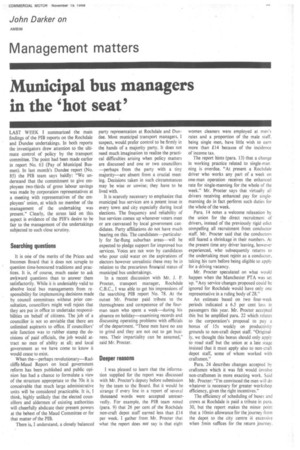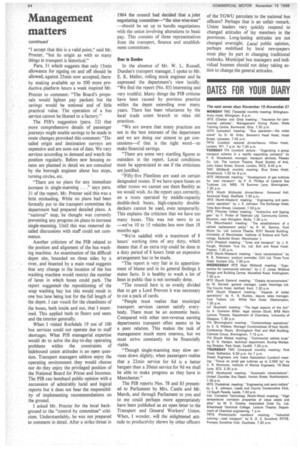Municipal bus managers in the 'hot seat'
Page 55

Page 56

If you've noticed an error in this article please click here to report it so we can fix it.
LAST WEEK I summarized the main findings of the PIB reports on the Rochdale and Dundee undertakings. In both reports the investigators drew attention to the ultimate control of policy by the transport committee. The point had been made earlier in report No. 63 (Pay of Municipal Busmen). In last month's Dundee report (No. 85) the PIB team says baldly: "We understand that the commitment to give employees two-thirds of gross labour savings was made by corporation representatives at a meeting with representatives of the employees' union, at which no member of the management of the undertaking was present." Clearly, the stress laid on this aspect is evidence of the PIB's desire to be fair to the management of the undertakings subjected to such close scrutiny.
Searching questions
It is one of the merits of the Prices and Incomes Board that it does not scruple to question time-honoured traditions and practices. It is, of course, much easier to ask awkward questions than to answer them satisfactorily. While it is undeniably valid to absolve local bus managements from responsibilitY for implementing decisions made by council committees without prior consultation, councillors might well rejoin that they are put in office to undertake responsibilities on behalf of citizens. The job of a councillor is not so enviable that there are unlimited aspirants to office. If councillors' sole function was to rubber stamp the decisions of paid officials, the job would attract no men of ability at all; and local government as we have come to know it would cease to exist.
When the—perhaps revolutionary—Radcliffe-Maud Report on local government reform has been published and public opinion has had a chance to formulate a view of the structure appropriate to the 70s it is conceivable that much large administrative units will be considered practicable. It is, I think, highly unlikely that the elected councillors and aldermen of existing authorities will cheerfully abdicate their present powers at the behest of the Maud Committee or for that matter of the PIB.
There is, I understand, a closely balanced party representation at Rochdale and Dundee. Most municipal transport managers, I suspect, would prefer control to be firmly in the hands of a majority party. It does not need much imagination to realize the practical difficulties arising when policy matters are discussed and one or two councillors —perhaps from the party with a tiny majority—are absent from a crucial meeting. Decisions taken in such circumstances may be wise or unwise; they have to be lived with.
It is scarcely necessary to emphasize that municipal bus services are a potent issue in every town and city especially during local elections. The frequency and reliability of bus services comes up whenever voters meet or are canvassed by local government candidates. Party affiliations do not have much bearing on this. The candidates—particularly for far-flung suburban areas—will be expected to pledge support for improved bus services. Votes are not won by candidates who pour cold water on the aspirations of electors however unrealistic these may be in relation to the precarious financial status of municipal bus undertakings.
In a recent discussion with Mr. J. P. Procter, transport manager, Rochdale C:B.C., I was able to get his impressions of the searching PIB report No. 78. At the outset Mr. Procter paid tribute to the thoroughness and competence of the fourman team who spent a week—during his absence on holiday—examining records and discussing operating problems with officials of the department. "These men have no axe to grind and they are not out to get business. Their impartiality can be assumed," said Mr. Procter.
Deeper reasons I was pleased to learn that the information supplied for the report was discussed with Mr. Procter's deputy before submission by the team to the Board. But it would be strange if every line in a report of several thousand words were accepted unreservedly. For example, the PIB team noted (para. 9) that 26 per cent of the Rochdale non-craft depot staff earned less than £14 per week. I gather from Mr. Procter that what the report does not Say is that eight
women cleaners were employed at men's rates and a proportion of the male staff, being single men, have little wish to earn more than £.14 because of the incidence of income tax.
The report hints (para. 13) that a change in working practice related to single-manning is overdue. "At present a Rochdale driver who works any part of a week on one-man operation receives the enhanced rate for single-manning for the whole of the week." Mr. Procter says that virtually all drivers receiving enhanced pay for singlemanning do in fact perform such duties for the whole of the week.
Para. 14 notes a welcome relaxation by the union for the direct recruitment of drivers, instead of the previously rigid edict compelling all recruitment from conductor staff. Mr. Procter said that the conductors still feared a shrinkage in their numbers. At the present time any driver leaving, however experienced, who subsequently returns to the undertaking must rejoin as a conductor, taking his turn before being eligible to apply for a driving vacancy.
Mr. Procter speculated on what would happen when the Manchester PTA was set up. "Any service changes proposed could be ignored for Rochdale would have only one representative in a ruling body of 28."
An estimate based on two four-week periods indicated a 6.5 per cent loss in passengers this year. Mr. Procter accepted this but he amplified para. 22 which relates to the corporation's proposal to pay a bonus of 15s weekly on productivity grounds to non-craft depot staff. "Originally, we thought this bonus should only apply to road staff but the union at a late stage insisted that it must apply also to non-craft depot staff, some of whom worked with craftsmen."
Para. 24 describes changes accepted by craftsmen which it was felt would involve non-craftsmen in more exacting work. Said Mr. Procter: "I'm convinced the men will do whatever is necessary for greater workshop efficiency, given the right incentives."
The efficiency of scheduling of buses and crews at Rochdale is paid a tribute in para. 30, but the report makes the minor point that a 10min allowance for the journey from the depot to the city centre it excessive when 5min suffices for the return journey, "1 accept that this is a valid point," said Mr. Procter, "but its origin as with so many things in transport is historical."
Para. 31 which suggests that only 15min allowance for signing on and off should be allowed, against 25min now accepted, thereby making available up to 500 more productive .platform hours a week inspired Mr. Procter to comment: "The Board's proposals would lighten pay packets but the savings would be notional and of little practical value. The operation of a bus service cannot be likened to a factory."
The PIB's suggestion (para. 32) that more comprehensive details of passenger journeys might enable savings to be made in route changes provoked this comment: "Detailed origin and destination surveys are expensive and are soon out of date. We vary services according to demand and watch the position regularly. Before new housing estates are planned in detail we are consulted by the borough engineer about bus stops, turning circles, etc.
"There are no plans for any immediate increase in single-manning . . ." says para. 31 of the report. Mr. Procter said this was a little misleading. While no plans had been formally put to the transport committee the department had prepared detailed plans. A "national" stop, he thought was currently preventing any progress On plans to increase single-manning. Until this was removed detailed discussions with staff could not commence.
Another criticism of the PIE related to the position and alignment of the bus washing machine. An examination of the difficult depot site, bounded on three sides by a river, and bisected by a main road suggests that any change in the location of the bus washing machine would restrict the number of lanes in which buses could park. The report suggestedthe repositioning of the soap washing bay but this would result in one bus lane being lost for the full length of the depot. I can vouch for the cleanliness of the buses, both inside and out, that I examined. This applied both to floors and seats and the interior generally.
When I visited Rochdale 19 out of 100 bus services could not operate due to staff shortages. What PIE managerial expertise would do to solve the day-to-day operating problems within the constraints of hidebound union attitudes is an open question. Transport managers seldom enjoy the operating environment they would choose nor do they enjoy the privileged position of the National Board for Prices and Incomes. The PIE can bombard public opinion with a succession of admirably lucid and logical reports but it does not bear the responsibility of implementing recommendations on the ground.
I asked Mr. Procter for the local background to the "control by committee" criticism. Understandably, he was not prepared to comment in detail. After a strike threat in 1964 the council had decided that a joint negotiating committee—"the nine wise men" —should be set up to handle negotiations with the union involving alterations to basic pay. This consists of three representatives from the transport, finance and establishment committees.
Over to Dundee




















































































































